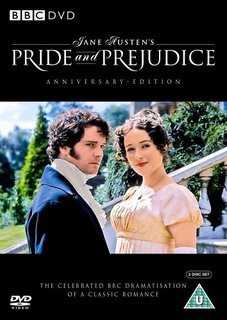Elizabeth, Darcy and more ....
Ahem ahem. …Encouraged by the somewhat unexpected response to my last post (4 comments as opposed to 0 comments on my last post …pathetic u say??? what to do am a man of mediocre ambitions) on a favorite classic adaptation I will take the liberty to critique another eternal favorite…
Jane Austen's delightful rendering of passion in polite society has inspired many an adaptation but the 1995 one, stands out not simply because of the canvas it employs to tell a story so heartwarming that it has touched the hearts of generations, but also because of the way it is told.
Austens six major published novels create a world within the world, the threat of the ensuing wars of that period and other socio political circumstances do cast their shadow over the dramatic flow of the novels but hardly so. One is reminded of them through an absentee family member or a dead one. But the world of Jane Austen is primarily that of a woman’s, Austen a wise and a judicious writer that she is, is believed to have said that since she had very little exposure to the outside worlds she could hardly write about them.
And this version of Austens arguably, greatest novel, plays on that very clash; that of the inner and the outer worlds, depicted brilliantly by use of spaces by the director. Elizabeth and her dilemmas find their way to the screen through the subtlest insinuations. We, the audience are enthralled by director Simon Langtons capacity to capture the inner conflicts of the characters through visual metaphors. Sample this- Elizabeth’s walks are important turning points of the film; the juxtaposition of her against the sprawling backdrops makes her a kind of a lone ranger, an iconoclast.
Jane Austen’s heroines were never overtly feminists, but in them a keen reader will notice the seeds of the feminist philosophy developing. Through their little way they defy the norms of the repressed English society of their times. Simon Langton’s Elizabeth exudes “a kind of self independent air “ which makes her quite detestable to the Bingley sisters, her gait and her mannerisms are not at all in keeping with the delicate movements that one associates with the women of that period. Her body language is distinctly more confident than all the other characters, both male and female.
Darcy is appropriately grave and smoldering but in him one sees the shadows of self-doubt and self-questioning (specially in his conversations with Elizabeth) that gives another dimension to the character. Interestingly the director chooses to sexualize Darcy’s character by making him emerge out of water (a la Bo Derek in 10 …ok maybe not that sexualized). One wonders if his intention to objectify Darcy was intentional….
Pride and Prejudice was always meant to be much more than the story of the realization of Darcy-Elizabeth love intrigue. Its as much a story of the other unions, namely that of Jane-Bingley, Mr.and Mrs.Bennet, Charlotte and Mr.Collins, Mr. And Mrs Gardener and of course Lydia-Wickham. The director rightly documents the development of these relationships as faithfully as possible.
The Bennet family is suitably dysfunctional, headed by an eccentric father and a hysterical, scheming, shallow, crude mother (Mrs.Bennet is not for nothing one of the most loved literary figures of all time). Mr.Collins seems to be a case of a masterstroke casting, for the actor lives the role. Thanks to the four-hour plus running time each and every character gets ample screen time to register growth.
All the actors more than rise to the occasion and deliver satisfactory performances, never trying to steal scenes from each other. The intention of each and every member of the cast and the crew of this production was obviously to produce a composite product instead of a patchily brilliant one.
Incidents that give an insight to the minds of the characters are of incredible importance in a novel, but most cinematic adaptations strangely choose to bypass them, focusing more on the dramatic flow of the film, this adaptation thankfully focuses on the incidents that shape the perception of a character i.e. the Charlotte -Elizabeth confrontation scene which ends with Elizabeth being disillusioned with the “pragmatic” Charlotte.
The BBC version of Pride and Prejudice is indeed a satisfying movie adaptation experience, especially to the sub genre of human race called “Pride and Prejudice-philes”. God knows we are hard to satisfy.
Here is to you Mr.Langton, your next fruit punch is on me.
Jane Austen's delightful rendering of passion in polite society has inspired many an adaptation but the 1995 one, stands out not simply because of the canvas it employs to tell a story so heartwarming that it has touched the hearts of generations, but also because of the way it is told.
Austens six major published novels create a world within the world, the threat of the ensuing wars of that period and other socio political circumstances do cast their shadow over the dramatic flow of the novels but hardly so. One is reminded of them through an absentee family member or a dead one. But the world of Jane Austen is primarily that of a woman’s, Austen a wise and a judicious writer that she is, is believed to have said that since she had very little exposure to the outside worlds she could hardly write about them.
And this version of Austens arguably, greatest novel, plays on that very clash; that of the inner and the outer worlds, depicted brilliantly by use of spaces by the director. Elizabeth and her dilemmas find their way to the screen through the subtlest insinuations. We, the audience are enthralled by director Simon Langtons capacity to capture the inner conflicts of the characters through visual metaphors. Sample this- Elizabeth’s walks are important turning points of the film; the juxtaposition of her against the sprawling backdrops makes her a kind of a lone ranger, an iconoclast.
Jane Austen’s heroines were never overtly feminists, but in them a keen reader will notice the seeds of the feminist philosophy developing. Through their little way they defy the norms of the repressed English society of their times. Simon Langton’s Elizabeth exudes “a kind of self independent air “ which makes her quite detestable to the Bingley sisters, her gait and her mannerisms are not at all in keeping with the delicate movements that one associates with the women of that period. Her body language is distinctly more confident than all the other characters, both male and female.
Darcy is appropriately grave and smoldering but in him one sees the shadows of self-doubt and self-questioning (specially in his conversations with Elizabeth) that gives another dimension to the character. Interestingly the director chooses to sexualize Darcy’s character by making him emerge out of water (a la Bo Derek in 10 …ok maybe not that sexualized). One wonders if his intention to objectify Darcy was intentional….
Pride and Prejudice was always meant to be much more than the story of the realization of Darcy-Elizabeth love intrigue. Its as much a story of the other unions, namely that of Jane-Bingley, Mr.and Mrs.Bennet, Charlotte and Mr.Collins, Mr. And Mrs Gardener and of course Lydia-Wickham. The director rightly documents the development of these relationships as faithfully as possible.
The Bennet family is suitably dysfunctional, headed by an eccentric father and a hysterical, scheming, shallow, crude mother (Mrs.Bennet is not for nothing one of the most loved literary figures of all time). Mr.Collins seems to be a case of a masterstroke casting, for the actor lives the role. Thanks to the four-hour plus running time each and every character gets ample screen time to register growth.
All the actors more than rise to the occasion and deliver satisfactory performances, never trying to steal scenes from each other. The intention of each and every member of the cast and the crew of this production was obviously to produce a composite product instead of a patchily brilliant one.
Incidents that give an insight to the minds of the characters are of incredible importance in a novel, but most cinematic adaptations strangely choose to bypass them, focusing more on the dramatic flow of the film, this adaptation thankfully focuses on the incidents that shape the perception of a character i.e. the Charlotte -Elizabeth confrontation scene which ends with Elizabeth being disillusioned with the “pragmatic” Charlotte.
The BBC version of Pride and Prejudice is indeed a satisfying movie adaptation experience, especially to the sub genre of human race called “Pride and Prejudice-philes”. God knows we are hard to satisfy.
Here is to you Mr.Langton, your next fruit punch is on me.


0 comments:
Post a Comment